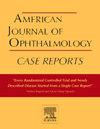Allogeneic anterior lens capsule transplantation (ALCT) for the management of HSV neurotrophic keratitis
Q3 Medicine
引用次数: 0
Abstract
Purpose
To report a case of allogeneic anterior lens capsule transplantation (ALCT) for the management of HSV neurotrophic epithelial keratitis.
Observations
An 81-year-old man was referred to our department due to neurotrophic keratitis in the left eye that he had been suffering from over the past 3 months. He had recurrent episodes of HSV keratitis in the left eye over the past 3 years and despite multiple previous treatments, there was no improvement. At the time of presentation, corrected distance visual acuity (CDVA) was 20/200 in the right eye and no light perception (NLP) in the left eye. Slit-lamp examination revealed a corneal epithelial defect with underlying stromal thinning and concomitant scarring. An allogeneic anterior lens capsule (ALC) was placed over the epithelial defect to act as a biological dressing, anchored with a droplet of fibrin glue. A bandage contact lens (BCL) was placed over to prevent the slippage of the ALC. No intra or postoperative complications were observed. Two weeks later, the ALC was removed revealing complete epithelial healing, while two months later the epithelium remained completely healed with a significant reduction of corneal scarring.
Conclusions and importance
Anterior Lens Capsule transplantation (ALCT) seems to be a promising new treatment option for the management of corneal neurotrophic keratitis.
同种异体前晶状体囊移植治疗HSV神经营养性角膜炎
目的报道1例同种异体前晶状体囊移植治疗HSV神经营养性上皮性角膜炎。患者81岁,左眼神经营养性角膜炎3个月来我科就诊。在过去的3年里,他的左眼反复发作HSV角膜炎,尽管多次治疗,但没有改善。患者就诊时,右眼矫正距离视力(CDVA)为20/200,左眼无光感(NLP)。裂隙灯检查显示角膜上皮缺损,伴有间质变薄和瘢痕。异体前晶状体囊(ALC)被放置在上皮缺损上作为生物敷料,用纤维蛋白胶滴固定。一个绷带隐形眼镜(BCL)被放置在防止ALC滑动。无术中及术后并发症。两周后,ALC被移除,显示上皮完全愈合,而两个月后,上皮完全愈合,角膜瘢痕明显减少。结论和重要性前晶状体囊移植(ALCT)似乎是治疗角膜神经营养性角膜炎的一种很有前途的新治疗选择。
本文章由计算机程序翻译,如有差异,请以英文原文为准。
求助全文
约1分钟内获得全文
求助全文
来源期刊

American Journal of Ophthalmology Case Reports
Medicine-Ophthalmology
CiteScore
2.40
自引率
0.00%
发文量
513
审稿时长
16 weeks
期刊介绍:
The American Journal of Ophthalmology Case Reports is a peer-reviewed, scientific publication that welcomes the submission of original, previously unpublished case report manuscripts directed to ophthalmologists and visual science specialists. The cases shall be challenging and stimulating but shall also be presented in an educational format to engage the readers as if they are working alongside with the caring clinician scientists to manage the patients. Submissions shall be clear, concise, and well-documented reports. Brief reports and case series submissions on specific themes are also very welcome.
 求助内容:
求助内容: 应助结果提醒方式:
应助结果提醒方式:


